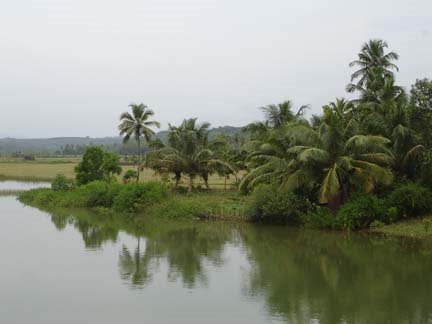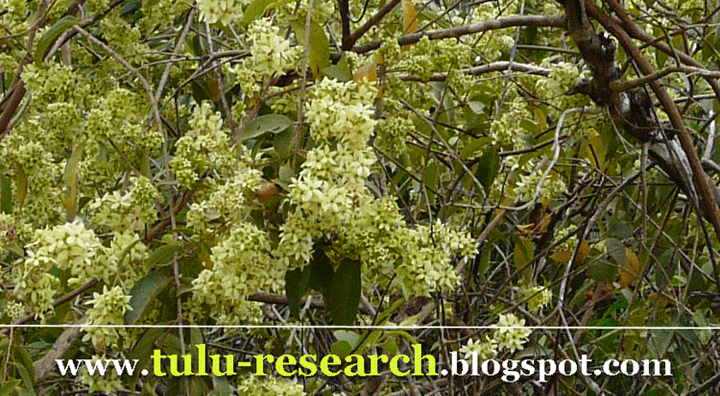What is common between the English word ‘sea’ and Indian word ‘samudra’ or 'sandra' (Kannada), apart from both represent a
large body of saline or marine water? In case you are not aware, both of these
words have another shade of meaning: a fresh water body, a lake
or pond especially in land locked regions. Similarly, the German word ‘see’ (related to English word 'sea' in origin) also means a lake or pond, a land
locked fresh water body. We shall discuss implications of these ancient analogous words in spatially remote langauges for lakes located in diverse land locked regions of the world.
The ancient declaration “Vasudaiva kutumbakam” (= the world is one family) clearly connotes
that our ancestors were in socio-cultural contact with diverse people from
different regions of the world. In other words, people of different region were
involved in journeys from their native lands to other regions, apparently for
the sheer thrill of exploration or various other reasons including search for
better havens, besides basic amenities of food, water, environment, shelter and
security. The tribal journeys are described as ‘migrations’ in scientific
literature.
Our previous post on the words: Bāhn, bāhana and banḍi (Post No. 405) – [bāhn-
German; bāhana-Bengali and banḍi-Dravida] - only documents one of
the ways the words have travelled to diverse regions along with ancient people
in olden days, acquiring in the process, slight modifications subject to
ambient socio-cultural and linguistic environments.
There
is another pattern of dispersion of word based analogous concepts among the
ancient people living in diverse regions of the world. We can illustrate this
concept, using the meaning and scope of a common word like Sea/Samudra in European
and Dravidian languages.
 |
| Landlocked fresh water bodies connected to Zurichsee, Switzerland |
Scope of meaning
of the words: Sea and Samudra
The English word ‘sea’ in general represents
a considerably large body of saline water. Similarly the Indian word ‘samudra’
also means the same. In coastal Karnataka, Tulu/Kannada areas, samudra exclusively means the sea like
the nearby Arabian sea.
 |
| Arabian Sea near St Marys island, off Malpe Udupi coast, Karnataka, India. |
However, the English word ‘sea’ also has a
meaning of a large body of water like lake or pond. Even though this usage is
not prevalent in coastal regions, in mainland Karnataka we can find numerous
lakes and ponds designated as ‘samudra’ (or simplified to sandra). Examples
like Singa Sandra, Vitta Sandra, Channasandra, Banasandra, Bommasandra, Dwarasamudra
etc illustrate this point. (One exceptional usage in coastal region can be
found in the name of Rāma-samudra
lake at Karkala town, probably named by migrants from Karnataka mainland during
the past history.
Strangely enough, the application of the
equivalent word representing sea or samudra to lakes is also existing quite
commonly in regions of Central Europe. The German equivalent word for sea is
‘see’. In Switzerland we can find numerous lakes called 'see' in German language,
like Zurichsee, Lake Lucerne (Vierwaldstättersee in German language), Bodensee, Untersee, Zugersee, Rotsee etc.
Migration of
the lingual/word concepts
Unlike in the case of words Bāhn, bāhana and banḍi (discussed in previous post here), in this case, we can find
the original scope and meaning of the word representing the sea or samudra has been transferred over distant lands in the past
history. Since the meaning of lake for the word sea is also found in old English, it probably means that in olden
days these equivalent synonymous words in
different languages (such as: sea, see,
samudra etc) were used in different
parts of the world, for describing smaller stretches of fresh water
bodies like lakes or ponds, especially in land locked regions, in the past. The similar lingual word connotations,
for the land locked fresh water bodies, as in this case, were appear to have
been carried to different regions by the ancient people migrating from one
region to another.
There could be equivalent words, synonymous
with sea, see or samudra in other languages for representing lakes. If you are
aware of such words you may kindly share with us in this blog.
** **
Sagara
Another related word 'Sagara' is equivalent of the English word ocean. In the modern times, however, the term is also being applied to reservoirs connected with major dams and irrigation projects. For example the Kannambadi reservoir ( KRS near Mysore), is named as Krishnaraja-Sagara. Similarly, we have Nagarjuna-Sagara and Hussain Sagar (Hyderabad) in Telangana/Andhra Pradesh.
** **
Sagara
Another related word 'Sagara' is equivalent of the English word ocean. In the modern times, however, the term is also being applied to reservoirs connected with major dams and irrigation projects. For example the Kannambadi reservoir ( KRS near Mysore), is named as Krishnaraja-Sagara. Similarly, we have Nagarjuna-Sagara and Hussain Sagar (Hyderabad) in Telangana/Andhra Pradesh.
R


